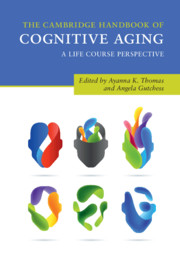Book contents
- The Cambridge Handbook of Cognitive Aging
- The Cambridge Handbook of Cognitive Aging
- Copyright page
- Contents
- Figures
- Tables
- Contributors
- Introduction
- Part I Models of Cognitive Aging
- Part II Mechanisms of Cognitive Aging
- Part III Aging in a Socioemotional Context
- Part IV Cognitive, Social, and Biological Factors across the Lifespan
- Part V Later Life and Interventions
- 32 Cerebrovascular Disease, Aging, and Depression: Clinical Features, Pathophysiology, and Treatment
- 33 The Role of Nutrition in Cognitive Decline
- 34 The Role of Sleep in Cognitive Aging
- 35 The Relationship between Accelerometer-Derived Metrics of Physical Activity and Cognition among Older Adults
- 36 Far Transfer and Cognitive Training: Examination of Two Hypotheses on Mechanisms
- 37 Maximizing the Impact of Cognitive Engagement Interventions for Older Adults
- 38 Mobility and Cognitive Decline in Older Adults with Cognitive Impairment
- 39 Current and Emerging Technologies for Supporting Successful Aging
- Part V Summary: Later Life and Interventions
- Index
- Plate Section (PDF Only)
- References
33 - The Role of Nutrition in Cognitive Decline
from Part V - Later Life and Interventions
Published online by Cambridge University Press: 28 May 2020
- The Cambridge Handbook of Cognitive Aging
- The Cambridge Handbook of Cognitive Aging
- Copyright page
- Contents
- Figures
- Tables
- Contributors
- Introduction
- Part I Models of Cognitive Aging
- Part II Mechanisms of Cognitive Aging
- Part III Aging in a Socioemotional Context
- Part IV Cognitive, Social, and Biological Factors across the Lifespan
- Part V Later Life and Interventions
- 32 Cerebrovascular Disease, Aging, and Depression: Clinical Features, Pathophysiology, and Treatment
- 33 The Role of Nutrition in Cognitive Decline
- 34 The Role of Sleep in Cognitive Aging
- 35 The Relationship between Accelerometer-Derived Metrics of Physical Activity and Cognition among Older Adults
- 36 Far Transfer and Cognitive Training: Examination of Two Hypotheses on Mechanisms
- 37 Maximizing the Impact of Cognitive Engagement Interventions for Older Adults
- 38 Mobility and Cognitive Decline in Older Adults with Cognitive Impairment
- 39 Current and Emerging Technologies for Supporting Successful Aging
- Part V Summary: Later Life and Interventions
- Index
- Plate Section (PDF Only)
- References
Summary
Strong evidence suggests that older adults at risk of cognitive decline benefit from healthy lifestyle strategies to prevent or delay cognitive disorders. In particular, nutrition has been shown to preserve cognitive functions. Nutritional interventions, whether with single nutrients or following dietary patterns, have all shown protective effects against cognitive decline. In particular, higher levels of vitamins C, D, E, K, and the B family were associated with a better cognitive status. Likewise, fruit and vegetable consumption and omega-3 intake were protective against declined cognition. Regarding dietary patterns, the Mediterranean-type diet, DASH, and MIND diets are all positively associated with slower rates of cognitive decline and decreased risk of incident Alzheimer’s disease and dementia. Nevertheless, intervention trials with vitamins or omega-3 supplements have not demonstrated conclusive evidence for preventing cognitive decline in healthy older adults, or for preventing loss or restoring function in patients with mild to moderate decline. Nutritional recommendations for older adults should emphasize dietary intakes of nutrients and food groups following those recommendations, as well as adoption of the Mediterranean, DASH, or MIND diets, in order to decrease risk of cognitive decline.
Keywords
- Type
- Chapter
- Information
- The Cambridge Handbook of Cognitive AgingA Life Course Perspective, pp. 612 - 627Publisher: Cambridge University PressPrint publication year: 2020

